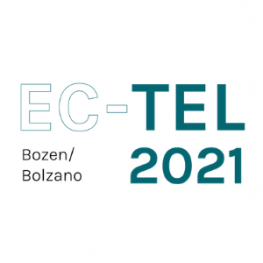Speakers
Maria Jesús Rodriguez-Triana
Tallinn University, EstoniaTinne De Laet
Katholieke Universiteit Leuven - KU Leuven, BelgiumAngela Fessl
Know-Center GmbH, AustriaGraz University of Technology, Austria
Start
22/09/2021 - 11:00
End
22/09/2021 - 12:30
Address
Zoom Room 1 @ EC-TEL Gather Town View mapPaper Session 1: Learning Goals, Design and Dashboards
Chair:  Roland Klemke
Roland Klemke
What Do Learning Designs Show about Pedagogical Adoption? An Analysis Approach and a Case Study on Inquiry-Based Learning
María Jesús Rodríguez-Triana, Luis Pablo Prieto and Gerti Pishtari Tallinn University, Estonia
Abstract: The usage of educational technologies does not necessarily imply the adoption of the pedagogical approaches they are designed to support. Existing works analysing learning design practices often focus on the usage metrics of the authoring platform, the authoring process or structural aspects of the designs themselves. While such usage metrics are useful to understand technology adoption, to understand pedagogical adoption we need to take into account the content of the designs created by practitioners as well. For example, in the case of inquiry-based learning, such content-related aspects include whether the learning designs scaffold the inquiry, promote engagement and collaboration. This paper proposes a concrete content-oriented design analysis approach for inquiry-based learning, which can be applied to digitally-authored inquiry designs. To illustrate its application and usefulness, we have applied this framework to learning designs created within Go-Lab (an initiative to promote inquiry learning in primary and secondary school). More concretely, we manually analyzed 44 learning designs published by Estonian practitioners using content analysis. Despite the small scale of the illustrative case study, the results from the content analysis show the potential of our analytical approach to inform teacher training and the development of authoring tools.
📄 Read More: https://link.springer.com/chapter/10.1007/978-3-030-86436-1_21
Interactive and Explainable Advising Dashboard Opens the Black Box of Student Success Prediction
Hanne Scheers and Tinne De Laet Leuven Engineering and Science Education Center (LESEC), KU Leuven, Belgium
Abstract: This paper presents exploratory research regarding the design and evaluation of a dashboard supporting the advising of aspiring university students incorporating a black-box predictive model for student success. While black-box predictive models can provide accurate predictions, incorporating them in dashboards is challenging as the black-box nature can threaten the interpretability and negatively impact trust of end-users. Explainable Learning Analytics aims to provide insights to black-box predictions by for instance explaining how the input features impact the prediction made. Two dashboards were designed to visualize the prediction and the outcome of the explainer. The dashboards supplemented the explainer with an interactive visualisation allowing to simulate how changes in the student’s features impact the prediction. Both dashboards were evaluated in user tests with 13 participants. The results show the potential of explainable AI techniques to bring predictive models to advising practice. We found that the combination of the explainer with the simulation helped users to compare the predictive model with their mental models of student success, challenging understanding of users and influencing trust in the predictive model.
📄 Read More: https://link.springer.com/chapter/10.1007/978-3-030-86436-1_5
The Impact of Explicating Learning Goals on Teaching and Learning in Higher Education: Evaluating a Learning Goal Visualization
★ Best paper candidate
Angela Fessl[1,2], Katharina Maitz[1], Sebastian Dennerlein[3], and Viktoria Pammer-Schindler[1,2] [1] Know-Center GmbH, Austria [2] Graz University of Technology, Institute for Interactive Systems and Data Science, Austria [3] Graz University of Technology, Haus der Digitalisierun, Austria
Abstract: Clear formulation and communication of learning goals is an acknowledged best practice in instruction at all levels. Typically, in curricula and course management systems, dedicated places for specifying learning goals at course-level exist. However, even in higher education, learning goals are typically formulated in a very heterogeneous manner. They are often not concrete enough to serve as guidance for students to master a lecture or to foster self-regulated learning. In this paper, we present a systematics for formulating learning goals for university courses, and a web-based widget that visualises these learning goals within a university’s learning management system. The systematics is based on the revised version of Bloom’s taxonomy of educational objectives by Anderson and Krathwohl. We evaluated both the learning goal systematics and the web-based widget in three lectures at our university. The participating lecturers perceived the systematics as easy-to-use and as helpful to structure their course and the learning content. Students’ perceived benefits lay in getting a quick overview of the lecture and its content as well as clear information regarding the requirements for passing the exam. By analysing the widget’s activity log data, we could show that the widget helps students to track their learning progress and supports them in planning and conducting their learning in a self-regulated way. This work highlights how theory-based best practice in teaching can be transferred into a digital learning environment; at the same time it highlights that good non-technical systematics for formulating learning goals positively impacts on teaching and learning.
📄 Read More: https://link.springer.com/chapter/10.1007/978-3-030-86436-1_1



